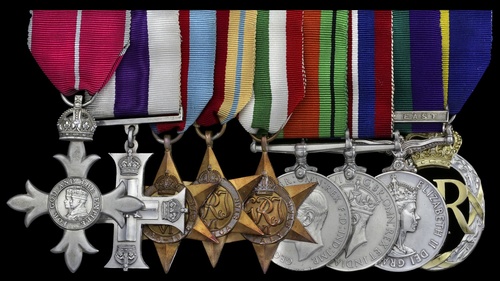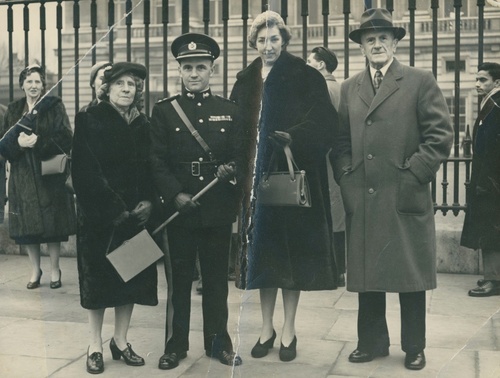Auction: 19002 - Orders, Decorations and Medals
Lot: 387A
'He is a perfect example of the British spirit to win through regardless of the odds.'
Harry Kline as described by Lieutenant-General Keightley, commander of V Corps in Italy
The outstanding Suez 1957 M.B.E., Second World War immediate Italy operations M.C. group of nine awarded to Lieutenant-Colonel H. Kline, Royal Engineers, decorated for clearing an obstruction on the River Po under heavy machine-gun fire during the Allied advance in April 1945
The Most Excellent Order of the British Empire, M.B.E. (Military) Member's 2nd type breast Badge, silver; Military Cross, G.VI.R, the reverse engraved '1945'; 1939-45 Star; Africa Star; Italy Star; Defence and War Medals 1939-45; General Service 1918-62, 1 clasp, Near East (Major H. Kline. M.B.E. M.C. R.E.); Army Emergency Reserve Decoration, E.II.R., nearly extremely fine, mounted as worn, with Royal Mint cases of issue for the M.B.E., M.C. and Army Emergency Reserve Decoration (9)
M.B.E. London Gazette 13 June 1957. The original recommendation states:
'Major Kline is an officer of the Army Emergency Reserve (2A) who was recalled for service on 10 August in command of 323 E & M Sqn RE which is composed entirely of Reservists. His was a difficult command, particularly during the time of waiting after recall to the Colours until embarkation for service overseas. However, Maj Kline, who had himself given up a good civilian appointment, threw his heart and soul into making his unit efficient and his men contented. He took great pains to explain the situation to his men and showed marked resourcefulness in finding interesting work and training for them. He displayed man management of an exceptional quality with an air of infectious cheerfulness and humour. It is difficult to over-stress his contribution in this connection.
When his unit landed in Port Said during the afternoon of L-Day Major Kline set to work with great energy to get a water point established on the quayside and electric light to speed unloading. His technical skill and ingenuity had a marked effect upon the efficiency of the build-up. Since then he has had unending worry over public utilities - water, light and sewage - and achieved remarkable results. He has displayed an excellent touch with men of diverse types, getting the best out of Egyptian engineers and civil labour as well as his own soldiery. He is the kind of man who has always been the backbone of the technical achievement of the British Army and in the preparation and execution of the present operations his skill, man management, energy and good humour have been quite outstanding.'
M.C. London Gazette 18 October 1945. The original recommendation states:
'On 10 April 45 at map ref 462547, Lt Kline was ordered to build a Bailey bridge for use by Fantails on the following morning, and was also informed that it was vital for a surprise attack by Infantry. Lt Kline recced the site and found a very large block of reinforced concrete, still attached to the blown and submerged bridge immediately in front of the bank-seat on the opposite abutment. Divesting himself of his jacket he swam across with a NCO and fixed the charges and then blew the demolition which proved entirely successful. During the whole of this time verey lights were put up by the enemy who were in close proximity. The bridge was finally erected as dawn broke, when it came under heavy and accurate fire from enemy 150mm guns. Two shells hit the ramp of the bridge and destroyed it, but quite heedless of the danger, Lt Kline with a small party, repaired the ramp - being forced to take cover several times from Spandau fire from a house 800 yds away. Fantails and tanks crossed this bridge and the subsequent operation was an entire success.
During the whole of this period, Lt Kline was an inspiration and a driving power behind his platoon. He is a perfect example of the British spirit to win through regardless of the odds and has the undying devotion of every man in his platoon.'
Harry Kline was born on 22 April 1918. He served as a Lieutenant with 220 Field Company, Royal Engineers in North Africa and Italy, and was awarded an immediate Military Cross for his gallantry and quick-thinking during the crossing of the River Po in April 1945. Ordered to build a Bailey bridge for the Allied crossing, he and an NCO laid charges and destroyed a reinforced concrete obstruction while under relentless fire from Spandau machine gun nests. His glowing M.C. recommendation by Lieutenant-General Keightley, commander of V Corps, was signed by Field Marshal Alexander of Tunis.
Kline served as a Major during the 1956 Suez Crisis, commanding 323 Electrical & Mechanical Squadron at Port Said. Despite the obstacles against him (lack of water, no electricity and poor drainage), he set about transforming the harbour's infrastructure to speed up the disembarkation of men and supplies. Through his 'skill, man management, energy and good humour', he moulded his entirely-Reservist unit into a 'remarkable' team. He sourced local Egyptian labour to see his projects to completion. His vital part in the Suez campaign was recognised with an M.B.E. in the 1957 Birthday Honours. On 29 July that year he became a Lieutenant-Colonel. He died on 23 June 2010; sold with an Order of Service for Kline's funeral on 7 July 2010, and a Royal Engineers cap badge.
Subject to 20% VAT on Buyer’s Premium. For more information please view Terms and Conditions for Buyers.
Sold for
£1,200
Starting price
£1200







